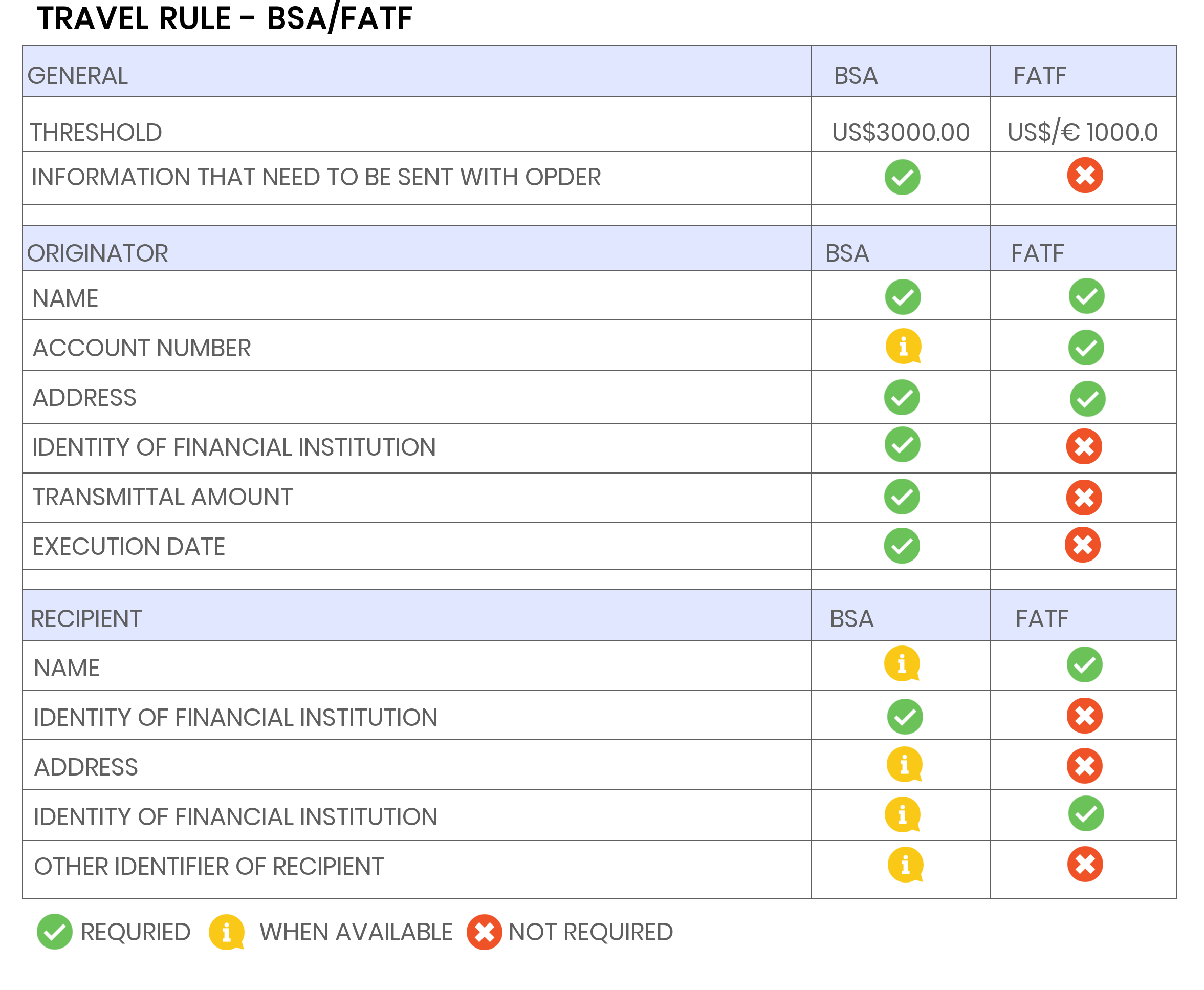
There is a new “travel rule” on the horizon. In guidance
released on June 21, 2019, the Financial Action
Task Force (FATF) gave updated recommendation for a way to mitigate money laundering
and terrorist
financing risks associated with virtual asset activities. Cryptocurrency exchanges
together with other
virtual crypto asset businesses are struggling with the meaning and impact of this
new guidance. When
this rule is adopted by FATF member countries, it will require them to share
customer information with
each other during transferring crypto assets. This is similar to the procedures that
U.S. banks are required
to abide by for wire transfers under the Bank Secrecy Act (BSA), which is often
referred to as the “Travel
Rule.”
According to Recommendation 16 of the FATF Interpretive Notes, both originator and
beneficiary
information should include the following:
-
History of FATF
The Financial Action Task Force (FATF) is an inter-governmental body established in 1989 by the Ministers of its Member jurisdictions. The objectives of the FATF are to set standards and promote effective implementation of legal, regulatory and operational measures for combating money laundering, terrorist financing and other related threats to the integrity of the international financial system. The FATF is therefore a “policy-making body” which works to generate the necessary political will to bring about national legislative and regulatory reforms in these areas.
The FATF has developed a series of Recommendations that are recognised as the international standard for combating of money laundering and the financing of terrorism and proliferation of weapons of mass destruction. They form the basis for a co-ordinated response to these threats to the integrity of the financial system and help ensure a level playing field. First issued in 1990, the FATF Recommendations were revised in 1996, 2001, 2003 and most recently in 2012 to ensure that they remain up to date and relevant, and they are intended to be of universal application
The FATF monitors the progress of its members in implementing necessary measures, reviews money laundering and terrorist financing techniques and counter-measures, and promotes the adoption and implementation of appropriate measures globally. In collaboration with other international stakeholders, the FATF works to identify national-level vulnerabilities with the aim of protecting the international financial system from misuse.
The Financial Action Task Force inter-governmental body advises 36 member countries and two regional organizations, and is one of the most influential voices globally on combating financial crimes. The FATF’s mandate was expanded in 2001 to include efforts to combat terrorist financing (CFT). Its influence also extends beyond its member countries, as a number of regional Financial Action Task Forces around the world provide guidance to regulators in the Caribbean Latin America, the Middle East, and North Africa. Its MoneyVal associate provides guidance to countries of Europe outside the EU, including Malta. -
Account number and Name of the originator
Required information: National identity number or Originator’s (physical) address, or customer identification number, or date and place of birth Name and account number of the beneficiary
For Cross-border transfers that values are below the USD/EUR 1,000 threshold should also include the names and account numbers of originator and beneficiary. (This information does not need to be verified) unless there is a suspicion of money laundering or terrorist financing. -
Compare new FATF Rule with Existing BSA Rule for U.S. Banks
We'll show a comparison on Pic 1 of the current BSA travel rule applied to banks and the soon-tobe-implemented FATF travel rule applied to virtual asset service providers (VASPs). As you can see on Pic 1 there is no significant differences between the FATF rule and BSA rule, FAT as well requires VASPs to share originator and beneficiary information with recipient.
Additionally, VASPs receiving transfers must also ensure they obtain “required originator information and required and accurate beneficiary information.” -
Do Banking AML Rules Fit Crypto Assets?
The FATF’s idea was to set stricter operating procedures for exchanges and
other virtual asset
service providers (VASPs), going beyond current customer due diligence (CDD)
rules and to align
them to bank regulations. Problem that we encounter here is that information
shared between
banks i.e. fields one fills out in a wire transfer request either don’t
exist in a cryptocurrency
transaction, or obtaining that information would violate individual privacy
to a degree potentially
unacceptable to the majority of cryptocurrency users.
This is place where our KYC mode gives solution to this problem, as we provide infrastructure that is needed to facilitate confidential customer data transfers on many different access levels.
FATF standards are not explicit on exactly how cryptocurrency exchanges must collect, verify or transfer this information, only stating that it is not necessary to attach the information directly to the transfers.
This has left exchanges around the world scratching their collective heads and wondering how to implement these rules while preserving privacy.
Without use of Welles KYC mode, difficulty in applying these recommendations to exchanges is clear as when compared to the formal banking system. Whereas banks rely on established interbank communication systems to move funds, cryptocurrencies are quickly and easily moved by simply using a recipient’s public address of which exchanges often have no way of verifying ownership. -
Mitigate Crypto Asset Risks and Protect Confidential Personal Data
The FATF’s objective is to “adequately mitigate the money laundering and terrorist financing risks associated with virtual asset activities.” and It is not to violate the privacy of users,
There a is danger that applying bank regulations to the crypto industry may drive more people to conduct peer-to-peer (P2P) transactions which lie outside the purview of VASP-controlled platforms. But if done correctly and with the right tool we will not have frightening spector of individuals becoming less transparent.
Solution we offer is in using blockchain analytics tools to aid in the legitimate investigation of criminals and terrorists using cryptocurrencies to hide their activities. Combined with our KYC Mode that is totally new technologies are required to maintain compliance with Anti-Money Laundering (AML) and Counter Terrorist Financing (CTF) regulations as defined with new FATF rule and legitimate concerns for privacy. -
The way to Enable Privacy-Enhanced Compliance
To that end, we believe cryptographically controlled privacy mechanisms can make it possible to have both anonymity and responsible disclosure of the source of funds for legitimate purposes such as criminal or terrorist investigations and AML compliance.
We are created — a collaborative know-your-customer (KYC) and AML ecosystem in which participating exchanges can securely transfer Proof of Knowledge without disclosing personally identifying information (PII).
We make KYC and AML faster, more efficient and open, all while maintaining a very high level of privacy and only revealing identity information when compelled to do so by legal authorities. This will foster the future growth of cryptocurrencies globally.
 Pic 1. - *Address can be substituted for national identity number, or customer
identification
number, or date and place of birth.
Pic 1. - *Address can be substituted for national identity number, or customer
identification
number, or date and place of birth.